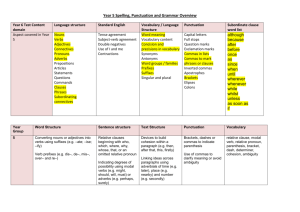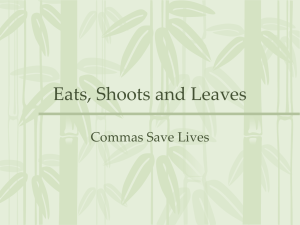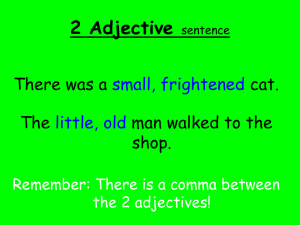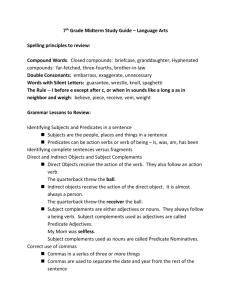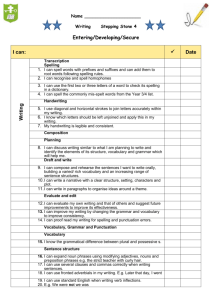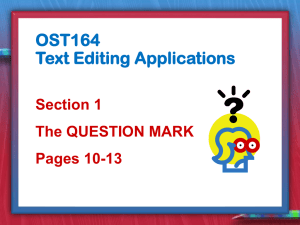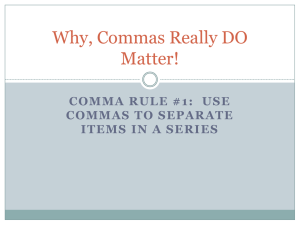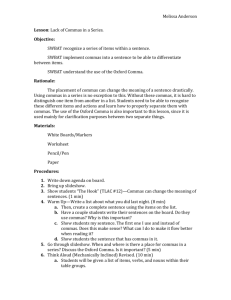Reading Comprehension Test Passage: Brewster Place
advertisement
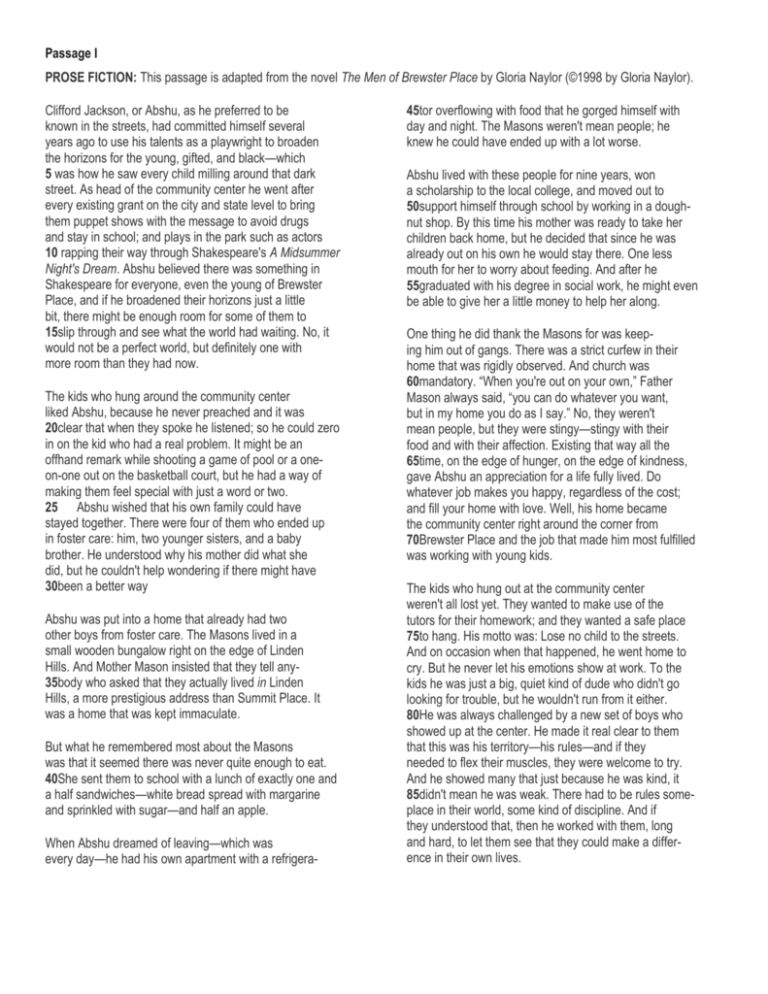
Passage I PROSE FICTION: This passage is adapted from the novel The Men of Brewster Place by Gloria Naylor (©1998 by Gloria Naylor). Clifford Jackson, or Abshu, as he preferred to be known in the streets, had committed himself several years ago to use his talents as a playwright to broaden the horizons for the young, gifted, and black—which 5 was how he saw every child milling around that dark street. As head of the community center he went after every existing grant on the city and state level to bring them puppet shows with the message to avoid drugs and stay in school; and plays in the park such as actors 10 rapping their way through Shakespeare's A Midsummer Night's Dream. Abshu believed there was something in Shakespeare for everyone, even the young of Brewster Place, and if he broadened their horizons just a little bit, there might be enough room for some of them to 15slip through and see what the world had waiting. No, it would not be a perfect world, but definitely one with more room than they had now. The kids who hung around the community center liked Abshu, because he never preached and it was 20clear that when they spoke he listened; so he could zero in on the kid who had a real problem. It might be an offhand remark while shooting a game of pool or a oneon-one out on the basketball court, but he had a way of making them feel special with just a word or two. 25 Abshu wished that his own family could have stayed together. There were four of them who ended up in foster care: him, two younger sisters, and a baby brother. He understood why his mother did what she did, but he couldn't help wondering if there might have 30been a better way Abshu was put into a home that already had two other boys from foster care. The Masons lived in a small wooden bungalow right on the edge of Linden Hills. And Mother Mason insisted that they tell any35body who asked that they actually lived in Linden Hills, a more prestigious address than Summit Place. It was a home that was kept immaculate. But what he remembered most about the Masons was that it seemed there was never quite enough to eat. 40She sent them to school with a lunch of exactly one and a half sandwiches—white bread spread with margarine and sprinkled with sugar—and half an apple. When Abshu dreamed of leaving—which was every day—he had his own apartment with a refrigera- 45tor overflowing with food that he gorged himself with day and night. The Masons weren't mean people; he knew he could have ended up with a lot worse. Abshu lived with these people for nine years, won a scholarship to the local college, and moved out to 50support himself through school by working in a doughnut shop. By this time his mother was ready to take her children back home, but he decided that since he was already out on his own he would stay there. One less mouth for her to worry about feeding. And after he 55graduated with his degree in social work, he might even be able to give her a little money to help her along. One thing he did thank the Masons for was keeping him out of gangs. There was a strict curfew in their home that was rigidly observed. And church was 60mandatory. “When you're out on your own,” Father Mason always said, “you can do whatever you want, but in my home you do as I say.” No, they weren't mean people, but they were stingy—stingy with their food and with their affection. Existing that way all the 65time, on the edge of hunger, on the edge of kindness, gave Abshu an appreciation for a life fully lived. Do whatever job makes you happy, regardless of the cost; and fill your home with love. Well, his home became the community center right around the corner from 70Brewster Place and the job that made him most fulfilled was working with young kids. The kids who hung out at the community center weren't all lost yet. They wanted to make use of the tutors for their homework; and they wanted a safe place 75to hang. His motto was: Lose no child to the streets. And on occasion when that happened, he went home to cry. But he never let his emotions show at work. To the kids he was just a big, quiet kind of dude who didn't go looking for trouble, but he wouldn't run from it either. 80He was always challenged by a new set of boys who showed up at the center. He made it real clear to them that this was his territory—his rules—and if they needed to flex their muscles, they were welcome to try. And he showed many that just because he was kind, it 85didn't mean he was weak. There had to be rules someplace in their world, some kind of discipline. And if they understood that, then he worked with them, long and hard, to let them see that they could make a difference in their own lives. Tuesday Sept 4 language arts daily edit 1st period The point of view from which the passage is told can best be described as that of: A. a man looking back on the best years of his life as director of a community center in a strife-ridden neighborhood. B. a narrator describing his experiences as they happen, starting with childhood and continuing through his adult years as an advocate for troubled children. C. an unidentified narrator describing a man who devoted his life to neighborhood children years after his own difficult childhood. D. an admiring relative of a man whose generosity with children was widely respected in the neighborhood where he turned around a declining community center. 2nd period It can reasonably be inferred from the passage that which of the following is a cherished dream that Abshu expects to make a reality in his lifetime? F. Establishing himself financially so as to be able to bring his original family back under one roof G. Seeing the children at the community center shift their interest from sports to the dramatic arts H. Building on the success of the community center by opening other centers like it throughout the state J. Expanding for some, if not all, of the children the vision they have of themselves and their futures 3rd period It can reasonably be inferred from the passage that Abshu and the Masons would agree with which of the following statements about the best way to raise a child? A. For a child to be happy, he or she must develop a firm basis in religion at an early age. B. For a child to be fulfilled, he or she must be exposed to great works of art and literature that contain universal themes. C. For a child to thrive and be a responsible member of society, he or she must develop a sense of discipline. D. For a child to achieve greatness, he or she must attach importance to the community and not to the self. 4th period The fourth paragraph (lines 31-37) establishes all of the following EXCEPT: F. that Abshu had foster brothers. G. that the Masons maintained a clean house. H. how Mother Mason felt about the location of their house. J. what Abshu remembered most about his years with the Masons. 5th period It can reasonably be inferred that which of the following characters from the passage lives according to Abshu's definition of a life fully lived? A. Mother Mason B. Father Mason C. Abshu as a child D. Abshu as an adult 6th period passage? Which of the following statements about the children entering the community center is supported by the F. They had unrealistic expectations that Abshu toned down in the course of informal conversations. G. In Abshu's eyes, they were all gifted. H. In Abshu's eyes, the children who were likely to succeed were the ones who gave him the most trouble at the outset. J. They were prepared to believe in each other more than in themselves. 7th period It can reasonably be inferred from the first paragraph that in obtaining outside funding for the community center, Abshu could be characterized as: A. thorough in seeking out potential sources for financial backing. B. reluctant to spoil the children with charity. C. excited about having the children write grant applications. D. determined to let the children decide how the money would be spent. Answers for Tuesday Sept 4 1st The best answer is C because the person who is telling the story is never identified. This unidentified narrator, however, knows enough about the main character, Abshu, to describe in detail Abshu's difficult childhood and his commitment as an adult to working in a community center. The best answer is NOT A because the narrator is not looking back on his own life; rather, an unidentified narrator is describing the life of the main character in the story, Abshu. The best answer is NOT B because the narrator is not describing his own personal experiences; rather, an unidentified narrator is describing the experiences of the main character in the story, Abshu. The best answer is NOT D because there is no evidence in the story that in any way identifies the narrator as "an admiring relative" of Abshu. In fact, there is nothing in the story that gives any identifying characteristics of the narrator. 2nd The best answer is J because the first paragraph specifically indicates that Abshu's goal was to expand the horizons of the children he worked with. In lines 2-5, the passage states that Abshu "had committed himself to . . . broaden the horizons for the young, gifted, and black—which was how he saw every child milling around . . ." Line 12 states a second time that he wanted to broaden their horizons. The best answer is NOT F. Even though Abshu "wished that his own family could have stayed together" when he was a child (lines 25-26), as an adult "he decided that since he was already out on his own he would stay there" (line 52-53). The passage suggests that Abshu might give his mother "a little money to help her along" (line 56), but he clearly does not want to bring the entire family back together under one roof. The best answer is NOT G because even though Abshu promotes dramatic arts and uses "his talents as a playwright to broaden the horizons" of the children (lines 3-4), there is no evidence in the passage to suggest that he wants to shift any child's interest away from sports. In fact, lines 22-24 suggest that he played one-on-one basketball with some of the children. The best answer is NOT H because the entire passage focuses on one community center; there is nothing in the passage that even mentions opening other centers. 3rd period The best answer is C because both the Masons and Abshu tried to develop discipline in the children under their care. In the Masons' home, "There was a strict curfew" (lines 58-59), which Abshu credited for "keeping him out of gangs" (lines 57-58). At the community center, Abshu also believed in discipline: "There had to be rules someplace in [the children's] world, some kind of discipline. And if they understood that, then he worked with them, long and hard" (lines 85-88). The best answer is NOT A. Lines 59-60 state that "church was mandatory" at the Masons, but there is no mention of religion in any context relating to Abshu's beliefs. The best answer is NOT B because there is no evidence that the Masons exposed their foster children to art and literature. Therefore, only Abshu believed in exposing young people to the great works of art and literature. The best answer is NOT D because there is no evidence in the passage to suggest that either the Masons or Abshu felt that the community was more important than the self for achieving greatness. 4th period The best answer is J. This question asks test takers to find the choice that is NOT included in the fourth paragraph. Information about what Abshu remembered most about his time with the Masons is included in the fifth paragraph (lines 38-42). The best answer is NOT F because the fourth paragraph does include information that Abshu had foster brothers: "Abshu was put into a home that already had two other boys from foster care" (lines 31-32). The best answer is NOT G because the fourth paragraph does include information that the Masons had a "home that was kept immaculate" (line 37). The best answer is NOT H because the fourth paragraph does include information about how Mother Mason felt about the location of their house: "Mother Mason insisted that they tell anybody who asked that they actually lived in Linden Hills, a more prestigious address than Summit Place" (lines 34-36). 5th period The best answer is D because the second half of the eighth paragraph specifically refers to what "gave Abshu an appreciation for a life fully lived" (line 66). The narrator goes on to explain that the job working with young kids was what made Abshu "most fulfilled" (lines 70-71). Abshu held this job as an adult. The best answer is NOT A because very little information is given about Mother Mason other than her need to have a prestigious address and the lunches she packed for school. The best answer is NOT B. There is a suggestion in the eighth paragraph that Father Mason may have helped Abshu define what a life fully lived was, but there is no evidence that Father Mason lived his life according to Abshu's definition. The best answer is NOT C because information in the passage suggests that Abshu's childhood as a foster child was difficult and that he "dreamed of leaving" every day (line 43), so as a child he had not even defined what a life fully lived could be. 6th period The best answer is G. Evidence for this choice is directly stated in lines 4-6: "young, gifted, and black, which was how Abshu saw every child milling around that dark street." The best answer is NOT F because details throughout the passage suggest that Abshu wanted to raise the children's expectations and "broaden the horizons" (lines 3-4); he did not want to tone down expectations. The best answer is NOT H. The passage does mention that Abshu "was always challenged by a new set of boys who showed up at the center" (lines 80-81), but there is no evidence anywhere in the passage to suggest that the boys who challenged him were more likely to succeed than others. The best answer is NOT J because there is no evidence in the passage to support the idea that the group of children at the center were more important than the individuals. 7th period The best answer is A because lines 6-7 explicitly state that Abshu "went after every existing grant on the city and state level." This statement clearly indicates that he was thorough in seeking out financial backing. The best answer is NOT B because nothing in the passage even mentions spoiling the children. The best answer is NOT C because there is no evidence in the passage that the children were in any way involved with grant writing. The best answer is NOT D because there is no suggestion in the passage that anyone but Abshu determined how the money would be spent. Wednesday Sept 5 1st period Commas: let you pause and take a breath; think of commas as a soft stop. Rule 1: Use a comma to separate two independent clauses connected by and, but, or, nor, for. Example: Bob was usually a quiet man, but he screamed upon entering the room. Insert commas where needed in the following sentence: The strange man lying under the brown and worn-out table appeared to be dead or just possibly he was only napping. 2nd period COMMAS Use commas after introductory a) clauses, b) phrases, or c) words that come before the main clause. Common starter words for introductory clauses that should be followed by a comma include after, although, as, because, if, since, when, while. Example: While I was eating, the cat scratched at the door. Write out the following sentence, using commas where needed. Because her alarm clock was broken she was late for class. 3rd period Commas: Rule 2: Use a comma to separate elements in a list or series; the comma is a substitute for and. Example: Bob tried to breathe, to keep from fainting, and to remember his first aid. Place commas in the following sentence where needed: Next to the man was a whistle a water balloon and a raccoon. 4th period COMMAS Write out the following sentence, using commas where needed. When the snow stops falling we’ll shovel the driveway. 5th period Commas Insert commas where needed in the following sentence: At Horizonte we aren’t allowed to swear use cell phones in class and use inappropriate language. 6th period COMMAS Write out the sentence, inserting commas where necessary. If you are ill you ought to see a doctor. 7th period Commas Insert commas where needed in the following sentence: Hey Maria can you come in here into the lab and help me fix this assignment? Answers for Wednesday Sept 5 1st period The strange man, lying under the brown and worn-out table, appeared to be dead, or just possibly he was only napping. 2nd period Because her alarm clock was broken, she was late for class 3rd period Next to the man was a whistle, a water balloon, and a raccoon. 4th period When the snow stops falling, we’ll shovel the driveway. 5th period At Horizonte, aren’t allowed to swear, use cell phones in class, and use inappropriate language. 6th period If you are ill, you ought to see a doctor. 7th period Hey, Maria, can you come in here, into the lab, and help me fix this assignment? Thursday Sept 6 1st period COMMAS Use commas to separate independent clauses when they are joined by any of these seven coordinating conjunctions: and, but, for, or, nor, so, yet. For example: The game was over, but the crowd refused to leave. Write out the following sentence, using commas where necessary. The student explained her question yet the instructor still didn't seem to understand. 2nd period COMMAS Write out the following sentence, using commas where necessary. Yesterday was her brother's birthday so she took him out to dinner. 3rd period COMMAS Common introductory phrases that should be followed by a comma include participial and infinitive phrases, absolute phrases, nonessential appositive phrases, and long prepositional phrases (over four words). For example: Having finished the test, he left the room. Write the following sentence, using commas where needed. To get a seat you'd better come early. 4th period COMMAS Use commas to separate three or more words, phrases, or clauses written in a series. Write the following sentence, using commas where needed. The Constitution establishes the legislative executive and judicial branches of government. 5th d period COMMAS Use commas to separate three or more words, phrases, or clauses written in a series. Write the following sentence, using commas where needed. The candidate promised to lower taxes protect the environment reduce crime and end unemployment. 6th period COMMAS Write the following sentence, using commas where needed. After the test I went jogging. 7th period COMMAS Write the following sentence, using commas where needed. I would love to invite her to dinner but I am not sure she would say yes. Answers for Thursday Sept 6 1st The student explained her question, yet the instructor still didn't seem to understand. 2nd Yesterday was her brother’s birthday, so she took him out to dinner. 3rd To get a seat, you’d better come early. 4th The Constitution establishes the legislative, executive, and judicial branches of government. 5th The candidate promised to lower taxes, protect the environment, reduce crime, and end unemployment. 6th After the test, I went jogging. 7th I would love to invite her to dinner, but I am not sure she would say yes. Friday Sept 7 1st period COMMAS Write the following sentence, using commas where needed. For the banquet the caterer recommended the following dishes: spaghetti with tomato sauce chicken alfredo and eggplant parmesan. 2nd COMMAS Write the following sentence, using commas where needed. I would love to come to the party; I can bring soda pop ice cream and candy bars. 3rd period COMMAS Use commas to separate three or more words, phrases, or clauses written in a series. Write the following sentence, using commas where needed. The prosecutor argued that the defendant who was at the scene of the crime who had a strong revenge motive and who had access to the murder weapon was guilty of homicide. 4th period COMMAS Use a comma to shift between the main discourse and a quotation. Write the following sentence, using commas where needed. John said without emotion "I'll see you tomorrow." 5th period COMMAS Use a comma to shift between the main discourse and a quotation. Write the following sentence, using commas where needed. "I was able" she answered "to complete the assignment." 6th period COMMAS Use a comma to shift between the main discourse and a quotation. Write the following sentence, using commas where needed. In 1848 Marx wrote "Workers of the world, unite!" 7th period COMMAS Use commas wherever necessary to prevent possible confusion or misreading. Write the following sentence, using commas where needed. To George Henry had been a sort of idol. Answers for Friday, Sept 7 1st For the banquet, the caterer recommended the following dishes: spaghetti with tomato sauce, chicken alfredo, and eggplant parmesan. 2nd I would love to come to the party; I can bring soda pop, ice cream, and candy bars. 3rd place commas after defendant, crime, motive, and weapon 4th place comma after emotion 5th place comma after able and answered 6th place comma after 1848 and wrote 7th place comma after George to separate the 2 names and clarify meaning
